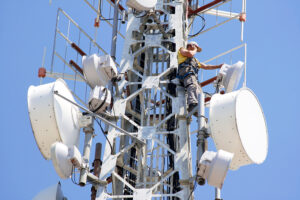Uncategorized
Where You Could Be Working with an FCC General Radio Operator License
Where You Could Be Working with an FCC General Radio Operator License
Research, Womp Womp
Does the thought of research make you feel uncomfortable? We understand. That’s why we have done the research for you! Check out the many careers you can use your shiny new FCC General Radio Operator License.
Microwave Radio Technician
 A microwave technician or Radio Frequency (RF) Technician is a technician whose responsibilities are to install and perform maintenance on RF systems. Your duties in this career are to perform installations of systems like wireless internet access points, cell phone towers, amplifiers, and other equipment used for transferring radio signals. You also maintain the systems, meaning you perform tests to confirm that all equipment is properly functioning, troubleshoot any errors that may occur, and perform repairs on all equipment if any malfunctions occur. As a microwave technician, travel is often necessary, as you do much of your work on-site.
A microwave technician or Radio Frequency (RF) Technician is a technician whose responsibilities are to install and perform maintenance on RF systems. Your duties in this career are to perform installations of systems like wireless internet access points, cell phone towers, amplifiers, and other equipment used for transferring radio signals. You also maintain the systems, meaning you perform tests to confirm that all equipment is properly functioning, troubleshoot any errors that may occur, and perform repairs on all equipment if any malfunctions occur. As a microwave technician, travel is often necessary, as you do much of your work on-site.
A salary anywhere from $40k-$70k is what a Microwave Radio Technician can expect to earn (variances should be expected depending on which state hired/company/extra credentials/experience).
Land Mobile Radio Field Service Technician
A salary anywhere from $68k-$80k, is what a Land Mobile Radio Field Service Technician can expect to earn (variances should be expected depending on which state hired/company/extra credentials/experience).
Radio Frequency Technician
Also known as radio mechanics, install, maintain, and upgrade RF systems, such as wireless Internet access points, cellular telephone antennas, satellite systems, amplifiers, two-way radios, and other radio equipment. Other tasks may include testing RF systems and signal strength, assembling systems, maintaining records, and instructing customers on how to properly use the equipment. Most RF technician jobs involve driving to client locations. Such technicians should be comfortable with heights. There is some risk of injury associated with this career due to the fact that technicians often work on towers or other high places, work closely with electricity, and use a range of potentially dangerous tools to complete their tasks. The majority of telecommunications technicians, such as RF systems technicians, work full-time, although overtime, on-call, evening, night, and weekend hours are a possibility.
A salary anywhere from $46k-$60k, is what a Land Mobile Radio Field Service Technician can expect to earn (variances should be expected depending on which state hired/company/extra credentials/experience).
Wireless Technician (Two-Way Radio Communications)
Two Way Radio and Microwave Field Technician
As a Two Way Radio and Microwave Field Technician you will be responsible for optimizing, maintaining, troubleshooting and repairing analog and digital Two Way Radios and other wireless communication systems at various sites. Other responsibilities include installation, preventative maintenance, testing, repairing, and modifying various 2-way radio infrastructures. Wireless communications systems include: complex radio systems for public safety and private businesses.
A salary anywhere from $39k-$67k, is what a Two-Way Radio and Microwave Field Technician can expect to earn (variances should be expected depending on which state hired/company/extra credentials/experience).
Electronic Communications System Tech – Field
Your duties in this line of work include installing, troubleshooting, repairing, aligning, and maintaining communication systems. In some cases you will be tasked with installing, configuring, and maintaining 2-way radio equipment. The support of digital and analog system infrastructure including the interagency ROIP dispatch system, microwave links, repeaters, and base stations can also be included.
The physical environment requires work to be done both inside and outside in heat/cold, wet/humid, and dry/arid conditions. Expect to do some traveling to different sites in this career.
A salary anywhere from $65k-$80k, is what an Electronic Communications System Tech-Field can expect to earn (variances should be expected depending on which state hired/company/extra credentials/experience).
Replay Operator/Scoring System Technician
 video control room, usually to do with sporting events. This includes in-house video production equipment, editing systems, control room equipment, supporting arena events, such as, concerts, sporting events (arena football, wrestling, college basketball, etc.), other events (religious gatherings, corporate events) Operational understanding of common video control room systems including replay, video switching, content playback, LED control, video shading, lighting control and graphics is also expected.
video control room, usually to do with sporting events. This includes in-house video production equipment, editing systems, control room equipment, supporting arena events, such as, concerts, sporting events (arena football, wrestling, college basketball, etc.), other events (religious gatherings, corporate events) Operational understanding of common video control room systems including replay, video switching, content playback, LED control, video shading, lighting control and graphics is also expected.Signal & Communications Technician
Signal & Communications technicians maintain, construct, and repair the equipment used for electronic communications, cable televisions, satellites, wireless devices, phones, radio, and broadband equipment. They may work on fiber optic lines, transmitters, antennas, and signal processing equipment. They may also operate network analyzers, spectrum analyzers, power meters, and RF generators. These technicians may be on call around-the-clock and work for telephone, cable, equipment repair, and research companies. Accordingly, some may work on new equipment in factory and manufacturing settings, while others may install or repair new or existing products in the field. Technicians may also work as cable systems installers, mobile radio technicians, electronic technicians, telecommunications specialists, wireless system supporters, and fiber optics systems specialists. To perform their duties, signal & communications technicians may need to use ladders or bucket trucks to work on aerial lines. In some cases, these workers may also use underground equipment to complete their tasks.
A salary anywhere from $50k-$75k, is what a Signal & Communications Technician can expect to earn (variances should be expected depending on which state hired/company/extra credentials/experience).
Tower Climber

Electro-Mechanical Technician
An electro-mechanical technician uses mechanical technology and knowledge of electrical and electronic circuits. They operate, test, and maintain robotic, unmanned, automated or electromechanical equipment. They work alongside mechanical and electrical engineers and in various industrial environments to include plastics, energy, computer, communications equipment manufacturing, and aerospace. An electro-mechanical technician has the tasks of testing and operating machines in factories or other worksites. This equipment may include aircraft, unmanned submarines, or similar types of equipment for uses in deep-ocean exploration, oil drilling, or hazardous waste removal. These technicians must also read schematics, blueprints, and diagrams to find the sequence and method of assembly of a piece of equipment, machine, or part. He or she verifies parts dimensions using precision measuring instruments to be sure specifications are met.
A salary anywhere from $45k-$68k, is what an Electro-Mechanical Technician can expect to earn (variances should be expected depending on which state hired/company/extra credentials/experience).
Wireless Network Field Technician
A Wireless Network Field Technician is responsible for network development and maintenance in the field. The individual works with the organization’s technical team and its clients to install, configure, maintain, and fix all LAN/WAN and other equipment issues, ensuring efficient network functionality. The technician maintains computer equipment, mobile devices, phones, cabling, routers, switches, and printers, among others, to address all of the client’s networking requirements either remotely or at the clients’ premises. Technicians must be prepared to work directly with clients as that may not come from technological backgrounds. Additionally, technicians must be prepared to do physical work like lifting and relocating equipment, climb heights to carry out cabling work, and wok in enclosed spaces when required.
A salary anywhere from $56k-$80k, is what a Wireless Network Field Technician can expect to earn (variances should be expected depending on which state hired/company/extra credentials/experience).
Broadcast Maintenance Technician (Multimedia)
Broadcast technicians perform the following duties: Install and operate all equipment, such as audio mixing consoles, media control systems, oscilloscopes, frequency analyzers, and satellite receivers, used to broadcast radio and television programs. These technicians also maintain equipment to ensure that it functions properly.
A salary anywhere from $44k-$71k, is what a Broadcast Maintenance Technician can expect to earn (variances should be expected depending on which state hired/company/extra credentials/experience).Wow! Those are some great jobs! Are you ready to get your FCC GROL now? Check out more information how HERE
Like this topic? Check out our latest and greatest blog posts HERE
